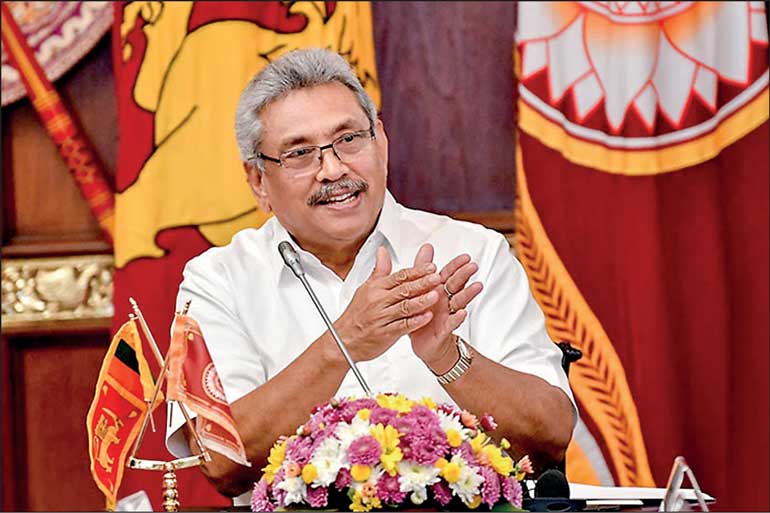Thursday Feb 12, 2026
Thursday Feb 12, 2026
Friday, 12 November 2021 00:00 - - {{hitsCtrl.values.hits}}

President Gotabaya Rajapaksa’s attempt to draft a new constitution through a special committee appointed by him is contrary to and in violation of the accepted rules and traditions pertaining to public participation in the drafting of a constitution
The constitution can be considered as the supreme law that determines the rights of citizens to life, liberty and property and also the most sacred legal document which establishes the structure and the functions of state rule.
liberty and property and also the most sacred legal document which establishes the structure and the functions of state rule.
With the transfer of the medieval world into a modern one, the genesis of the concept of sovereignty rested with the people and not the king. This has given impetus to the emergence of the theory that state power is always subject to the will of the people.
According to the Constitution of Sri Lanka, the sovereignty of the Republic is vested in the people. It is an inalienable power. Not only is the power of the State but also the Constitution itself is considered as a thing that belongs to the people. According to the classical liberal interpretation, “the Constitution is acknowledged to be an agreement that the society entered into with the rulers on how they should be governed”.
Constitution making
The practice of constitution making has been changing over the past two centuries. The system of constitution making which was confined to a selected few of educated elites and the representatives of the legislature can be said to have become obsolete now. The participatory methodology of adopting constitutions has become the accepted model of constitution making in the 21st century. So much so, numerous experiments have been carried out in various countries on participatory constitution making.
The right of the people to actively participate in constitution making is recognised by international covenants of the United Nations as well. According to the interpretation given by the textual authority of the Human Rights Commission on 12 July 1996 in Article 25 of the International Covenant on the Civil and Political Rights of the United Nations which reads as “the right of the people to participate in public affairs,” the people are entitled to participate in the process of constitution making. This right is recognised by international law as well.
President Gotabaya Rajapaksa’s attempt to draft a new constitution through a special committee appointed by him is contrary to and in violation of the accepted rules and traditions pertaining to public participation in the drafting of a constitution. The Government appears to believe that the making of a constitution is a matter for the Government rather than of the people. This anti-democratic attempt by the Government can be seen as a spurious act being carried out with a hidden and malicious intent.
Sri Lanka needs a new constitution
We also admit that Sri Lanka needs a new constitution. In a democratic sense, the current constitution is not only bad, but also a one that is distorted and has lost its legitimacy and efficacy due to being corrupted persistently. In particular, it does not have the capacity to formulate constitutional policies and structures needed to overcome the current crisis facing Sri Lanka. Therefore, we need a new constitution. But it should be formulated in a democratic manner with the active participation of the people, and not in an arbitrary manner.
Also it must be said that we in Sri Lanka do not possess a good history in making and using constitutions. It is an unpleasant history that we should regret and be ashamed of. Viewed from the practical experience of the regime of Gotabaya Rajapaksa, it appears that the task of making a new constitution has not been undertaken with good democratic intentions. Sri Lanka needs a new constitution not to reinforce the dictatorial powers of the ruler, but to overcome the crisis facing Sri Lanka and to maintain a sustainable development with the rule of law.
The current crisis
The nature of the current crisis encountered can be summed up as follows: The entire social system is in a state of complete collapse. The unity and integrity that should exist in the social system is in a state of total disintegration. Conflicts between ethnic groups and religions have turned into violent struggles, shattering the fabric of social order. The working people of the country (wage workers, farmers and fishermen), professionals and entrepreneurs are in an extremely difficult and confused state being unable to maintain their daily lives, livelihoods and businesses. The State and its system of institutions (the Legislature, Executive and Judiciary) are in a state of maximum decay, degeneration and on their way towards bankruptcy. Misappropriation of public property by the ruling party, which has been in operation since 1978, also can be said to have significantly contributed to the problem of not having adequate income to run the affairs of the State.
The need for formulating constitutional policies and structures required for overcoming the crisis Sri Lanka is currently facing can be stated as the most important reason among several others that has necessitated the adoption of a new constitution. This historic task cannot be achieved by conventional politicians except the people.
The main responsibility of plunging the country into a major devastation of this magnitude invariably lies with the conventional politicians. The degeneration and failure of Sri Lanka can be considered as the ultimate end result of their failure. How could one expect legislation of a sound constitution to make Sri Lanka a successful state, from a group of politicians who have been the cause of the failure of the country?
The degree of failure manifested by the Legislature in the realm of legislation is enormous. For example the amendment to the Pradeshiya Sabha electoral law eventually ended up with the number of councillors in local bodies being doubled up. The amount of unnecessary expenditure it has incurred on the country is enormous. It reflects the extent of failure displayed by the Legislature in the field of legislation.
A participatory constitution
In view of the above, on every front, Sri Lanka is now in a very serious and critical situation. Making a new constitution can be considered as a momentous step taken to determine the present and future course of the country. Such a serious responsibility cannot be considered an easy task that can be performed by tabling a document drafted secretly, in the Parliament and simply raising the hand in agreement of it. It can be considered as an act of absurdity. Such things could lead to aggravate the devastation that has already set in.
Therefore, the spurious program of constitution making launched by the Government should be defeated for the common good of the country. At the same time, an attempt must be made to win a participatory constitution that will facilitate overcome the crisis facing the country.
It is only on special occasions such as this that the people are directly involved in matters relating to the State administration. At other times they act in compliance with the representative democratic system. The adoption of a new constitution can be considered as an opportunity where all communities are directly intervened in the democratic process. Once that task is completed and the representative democratic system is redesigned to include direct democratic elements, the people will leave the stage allowing the new system to function.
The process outlined above to be adopted in enacting the proposed new constitution can be described as an opportunity received by the people to exercise their sovereignty to the fullest. A democratic constitution is no longer an entity which merely establishes a democratic system of governance alone, but a system that must be formulated within a democratic process in which the people are involved actively.
Constitution and crisis
Apart from defeating the spurious approach adopted by the Government in making the proposed new constitution, it is essential, for the common good of the country, to win a participatory program in making it so that it would be possible to introduce constitutional policies and structures needed to overcome the crisis facing Sri Lanka.
It is important to understand the interrelationship between the constitution and the crisis facing the country. The acts like the arbitrary ban on chemical fertilisers, non-return of land taken over during the war in the north, cannot be carried out in countries like India or South Africa. The reason being that no matter how big the electoral victories of the rulers were, the constitution of both countries contain adequate policies and guidelines that prevent rulers resorting to such arbitrary actions.
The intention of this document is to oppose the arbitrary legislation of the proposed new constitution by the Government and raise awareness of the public, public organisations, political parties and political groups, of the need to defeat it and win a participatory framework for adopting the new constitution for the country.
Mass agitation program
The country needs a mass agitation program to defeat the Government’s spurious constitution program and also to win a participatory constitution for the country. At the same time, a case of public interest litigation aimed at achieving these two objectives supported by huge public participation also should be brought to the fore.
The case of public interest litigation should aim at receiving an order against the Government’s spurious program of making the proposed new constitution and also obtaining directions and guidelines for legislation of a participatory constitution. Moreover, this public interest litigation case should reflect the aspirations separately and collectively, of all ethnic, religious, gender, cultural and oppressed groups, all workers, farmers, fishermen, trade unions, professionals and businessmen.
We firmly urge all ethnic, religious, gender and cultural groups, trade unions, farmers’, fisheries and other public organisations, professionals organisations, commercial and business organisations as well as political parties to pay their serious attention to this fundamental issue that we emphasise.
[This article was penned by me to make public organisations aware of the serious implications associated with the proposed new constitution following a discussion I had with Basil Fernando of the Asian Human Rights Commission and Brito Fernando, who can be considered a leading figure making a voice for the cause of the disappeared persons. This note has already led to arouse interest of a large number of public organisations to come together and to file a public litigation case in respect of the two objectives dealt with it. If there are public organisations or individuals who would like to be part of this public lawsuit, please contact Britto (077 3184532) or Sampath (0773601343) for details.]